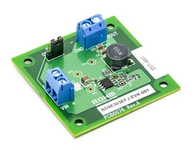BD9E303UEFJ-LB(E2)
7.0V to 36V Input, 3.0A Integrated MOSFET Single Synchronous Buck DC/DC Converter
BD9E303UEFJ-LB(E2)
7.0V to 36V Input, 3.0A Integrated MOSFET Single Synchronous Buck DC/DC Converter
This is the product guarantees long time support in Industrial market. BD9E303UEFJ-LB(E2) is a synchronous buck switching regulator with built-in power MOSFETs. It is a current mode control DC/DC converter and features high-speed transient response. Phase compensation can also be set easily.
BD9E303UEFJ-LB is also available as a small reel product with 250 packages.→BD9E303UEFJ-LBH2
This IC uses different production line against series model BD9E303EFJ-LB for the purpose of improving production efficiency. We recommend using this IC for your new development. Electric characteristics noted in Datasheet does not differ between Production Line. In addition, the data of BD9E303EFJ-LB is disclosed for documents and design models unless otherwise specified.
Product Detail
Specifications:
ch
1
Integrated FET / Controller
Integrated FET
Topology
Buck
Synchronous / Nonsynchronous
Synchronous
Vin1(Min.)[V]
7
Vin1(Max.)[V]
36
Vout1(Min.)[V]
1
Vout1(Max.)[V]
28.8
Iout1(Max.)[A]
3
SW frequency setting (Max.)[MHz]
0.3
Light Load mode
No
EN
Yes
PGOOD
No
Operating Temperature (Min.)[°C]
Tj=-40
Operating Temperature (Max.)[°C]
Tj=150
Package Size [mm]
4.9x6.0 (t=1.0)
Features:
- Long Time Support Product for Industrial Applications.
- Synchronous single DC/DC converter.
- Over-Current Protection.
- Short Circuit Protection.
- Thermal Shutdown Protection.
- Under voltage Lockout Protection.
- Soft Start.
- HTSOP-J8 package (Exposed Pad).
Reference Design / Application Evaluation Kit
-

- Evaluation Board - BD9E303EFJ-EVK-001
This EVK is using not BD9E303UEFJ-LB, but BD9E303EFJ-LB. BD9E303EFJ-EVK-001 Evaluation board delivers an output 5.0 volts from an input 7.0 to 36 volts using BD9E303EFJ-LB, a synchronous rectification step-down DC/DC converter integrated circuit, with output current rating of maximum 3A. The output voltage can be set by changing the external parts of circuit and the loop-response characteristics also can be adjusted by the phase compensation circuit.

